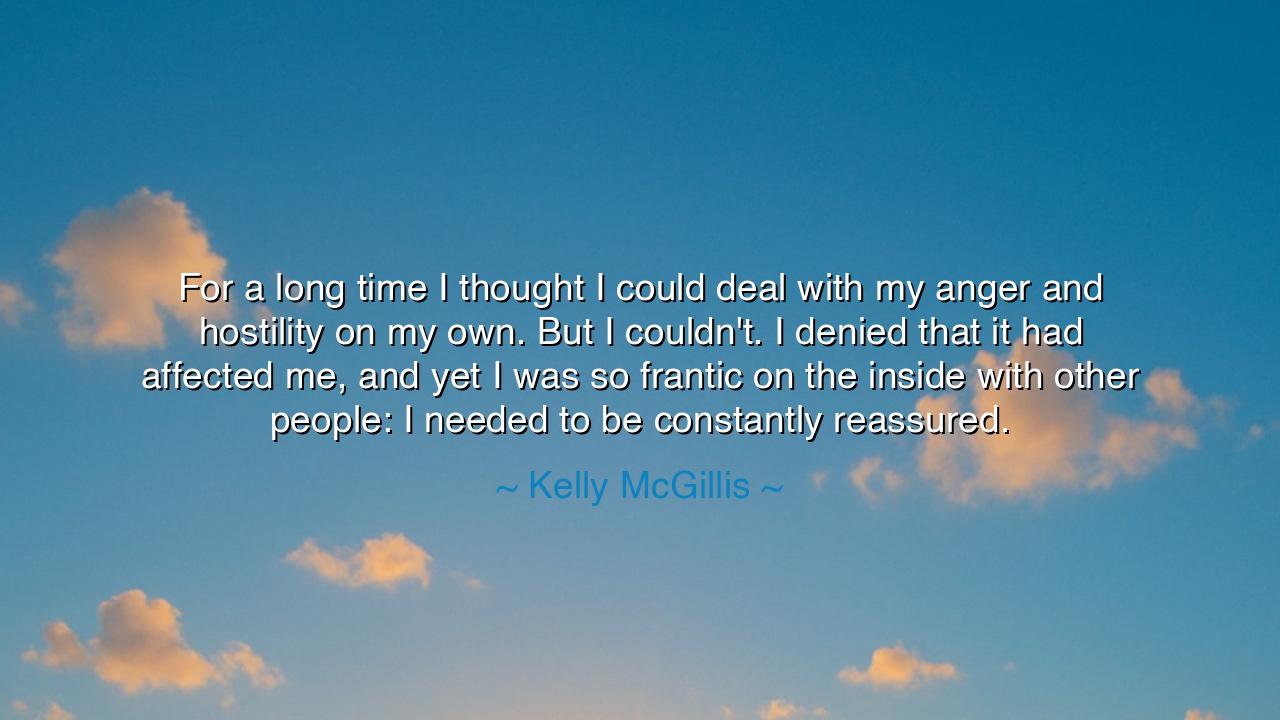
For a long time I thought I could deal with my anger and
For a long time I thought I could deal with my anger and hostility on my own. But I couldn't. I denied that it had affected me, and yet I was so frantic on the inside with other people: I needed to be constantly reassured.






Host: The room was quiet, the soft light from the lamp casting a warm, calming glow over the space. Outside, the world had settled into night, and the air was filled with a peaceful stillness. Jeeny sat at the table, her fingers lightly tracing the edge of her cup, her expression contemplative. Jack, standing by the window, gazed out at the darkened world, lost in thought. There was an unspoken tension in the air, a sense that the conversation was about to touch on something deeply personal.
Jeeny: (breaking the silence, her voice calm but thoughtful) “I came across something by Kelly McGillis today that really made me reflect. She said, ‘For a long time I thought I could deal with my anger and hostility on my own. But I couldn't. I denied that it had affected me, and yet I was so frantic on the inside with other people: I needed to be constantly reassured.’ What do you think about that?”
Jack: (pauses, his voice soft) “It’s a raw, honest admission, isn’t it? It’s about how we often try to suppress or handle our emotions, especially something like anger, on our own, thinking we can just push through it. But what she’s saying is that no matter how hard we try to deny it, those emotions don’t just disappear—they affect us, they affect how we interact with others. That need for constant reassurance is like a reflection of the internal franticness, the conflict we’re trying to ignore.”
Jeeny: (nodding slowly) “Exactly. It’s easy to tell ourselves that we can handle things alone, that we don’t need others to see our vulnerabilities or our struggles. But the truth is, when we deny how we’re feeling—especially when it’s something as powerful as anger—it can affect us in ways we don’t even realize. That’s what I find so interesting about her statement. She’s acknowledging that anger doesn’t just go away because we pretend it’s not there.”
Host: The stillness in the room grew deeper as Jeeny’s words sank in. Jack turned slightly toward her, his expression thoughtful. The night had grown still outside, and inside, their conversation had shifted into something more personal—about the way we often suppress emotions, especially negative ones, and the consequences of doing so.
Jack: (his voice more reflective) “I think what stands out to me is how she describes the franticness on the inside. It’s like we’re constantly trying to manage all these unresolved emotions, and instead of them being dealt with, they end up controlling us. That constant need for reassurance is a sign that we’re not at peace with ourselves, and when we don’t deal with anger directly, it makes us feel unsteady, uncertain in our interactions with others.”
Jeeny: (softly) “Yes. And I think it’s also about the need for validation. When we’re angry but don’t confront it, we turn to others to fill the gaps, to give us the affirmation we’re not giving ourselves. But that external reassurance is only a temporary fix—it doesn’t address the real issue, which is how we’re dealing with our own feelings. Without confronting the source of the anger, we remain trapped in a cycle of needing external validation.”
Jack: (pauses, considering) “It’s like we’re constantly trying to seek something outside of ourselves to make us feel whole, but we’re not really addressing the root of what’s bothering us. And the cycle repeats because we’re never really healing or resolving what’s inside us. It’s only when we face our feelings—whether it’s anger or anything else—that we can start to find peace.”
Jeeny: (gently) “Exactly. Facing our emotions isn’t easy, but it’s necessary for our growth. It’s only by accepting that we’re affected by them that we can begin to understand their impact on our lives. When we try to suppress them or act like they don’t matter, we end up projecting that frantic energy onto others, and it’s impossible to find peace that way.”
Host: The quiet between them deepened, the conversation growing more introspective. Jack’s posture softened as he reflected on the complexity of emotions and how they affect us. Outside, the world had turned silent, but inside, there was a shared understanding that emotional healing begins with acceptance and the courage to face difficult feelings head-on.
Jack: (smiling softly, his voice more assured) “I think it’s a reminder that we don’t have to carry these emotions alone. When we face them, when we allow ourselves to feel them, we begin to find peace. It’s not about avoiding or suppressing—it’s about accepting and processing.”
Jeeny: (nodding warmly) “Yes. And in doing so, we free ourselves from the constant need for external validation. We learn to trust ourselves, to find balance within, and that’s when we start to find true peace.”
Host: The world outside had slipped into the stillness of night, but inside, the room felt full of understanding. Jeeny and Jack had uncovered a simple yet profound truth—that confronting and accepting our emotions, rather than denying them, is the key to healing and finding peace. When we acknowledge what we feel, we give ourselves the opportunity to transform our internal conflict into growth and self-understanding.






AAdministratorAdministrator
Welcome, honored guests. Please leave a comment, we will respond soon